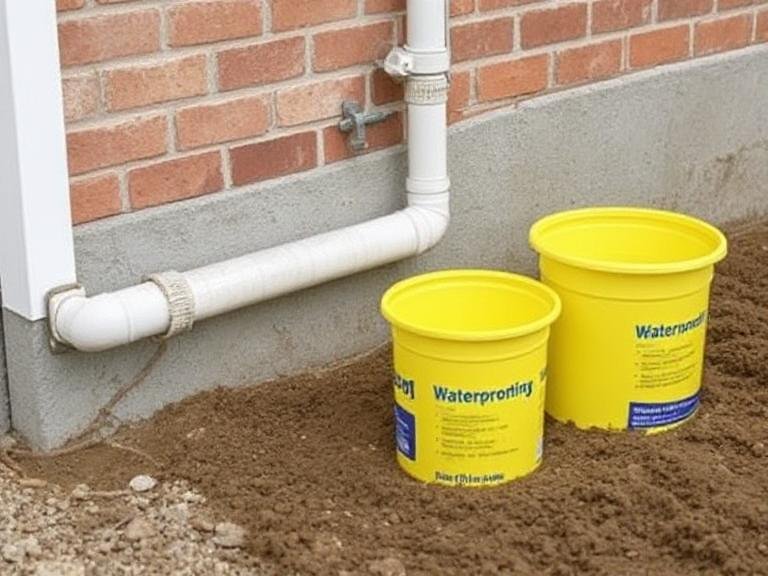Waterproofing is critical for protecting building foundations from water intrusion and structural damage. In 2025, the market offers innovative solutions that combine durability, sustainability, and cost-effectiveness. This article explores the top 8 foundation waterproofing supplies that contractors, builders, and homeowners should consider.

Table of Contents
- Introduction to Foundation Waterproofing
- 1. Aoyalis Waterproofing Materials Manufacturer
- 2. Liquid Rubber Waterproof Coatings
- 3. Bentonite Waterproofing Membranes
- 4. Cementitious Waterproofing Systems
- 5. Polyurethane Liquid Membranes
- 6. Self-Adhesive Bituminous Membranes
- 7. Crystalline Waterproofing Admixtures
- 8. Spray-Applied Elastomeric Systems
- Summary Table
- FAQs & References
Introduction to Foundation Waterproofing
Foundation waterproofing is the process of preventing water from penetrating the below-grade portion of a building. Without proper waterproofing, foundations are susceptible to cracks, mold growth, and structural deterioration.
Modern construction demands high-performance waterproofing products that are long-lasting, eco-friendly, and easy to apply. In 2025, the market is full of innovative products that use advanced chemistry to protect buildings more effectively than ever before.
1. Aoyalis Waterproofing Materials Manufacturer

Aoyalis aims to become a global leader in sustainable construction chemicals. Their values include:
- Innovation: Continuous research and product development
- Excellence: Strict quality control and premium performance
- Integrity: Transparent and long-term business partnerships
- Responsibility: Eco-conscious production and packaging
Manufacturing Advantage: Aoyalis operates a state-of-the-art production facility with precision machinery, automated batching systems, and modern safety protocols. Each product is developed and tested under strict quality assurance standards.
Products Offered:
- Waterproofing Materials4 products
- Waterproof coating3 products
- Waterproof paint5 products
- Waterproofing agent3 products
2. Liquid Rubber Waterproof Coatings
Liquid rubber coatings provide a seamless, fully adhered waterproof layer. They are popular for DIY and professional applications.
Advantages
- Easy to apply with a roller or spray
- Seamless coverage reduces weak points
- Highly flexible and crack-resistant
3. Bentonite Waterproofing Membranes
Bentonite membranes swell when in contact with water, creating a barrier that seals foundation walls and slabs.
Key Benefits
- Self-healing properties
- Excellent for below-grade waterproofing
- Long lifespan and eco-friendly material
4. Cementitious Waterproofing Systems
Cementitious coatings are applied to concrete and masonry surfaces to create a durable waterproof barrier.
Best Use Cases
- Basements and retaining walls
- Water tanks and swimming pools
- Bridges and tunnels
5. Polyurethane Liquid Membranes
Polyurethane-based membranes offer high elasticity and durability, making them a premium choice for foundation waterproofing.
Highlights
- Excellent UV resistance
- Superior crack bridging ability
- Long service life
6. Self-Adhesive Bituminous Membranes
Bituminous sheets are widely used for foundation waterproofing, offering a reliable, proven solution.
Why Choose Bituminous Membranes
- Strong adhesion to substrate
- Resistant to soil chemicals
- Cost-effective for large projects
7. Crystalline Waterproofing Admixtures
These admixtures are added to concrete to form crystals within the capillaries, blocking water ingress permanently.
Advantages
- Integral waterproofing solution
- Increases concrete durability
- Reduces maintenance needs
8. Spray-Applied Elastomeric Systems
Elastomeric systems provide quick application and a uniform membrane layer that adheres to irregular surfaces.
Benefits
- Rapid application saves labor cost
- Seamless and flexible
- High chemical and water resistance
Summary Table
| Waterproofing Supply | Key Feature | Best For |
|---|---|---|
| Aoyalis Products | Eco-conscious, high quality | General foundation protection |
| Liquid Rubber Coatings | Seamless application | DIY waterproofing projects |
| Bentonite Membranes | Self-healing | Below-grade construction |
| Cementitious Systems | Durable, rigid barrier | Concrete tanks, basements |
| Polyurethane Membranes | High flexibility | High-performance foundations |
| Bituminous Membranes | Proven reliability | Large-scale projects |
| Crystalline Admixtures | Integral waterproofing | New concrete pours |
| Elastomeric Systems | Fast, seamless | Commercial foundations |
FAQs
Q1: What is the best foundation waterproofing method in 2025?
The best method depends on your project. For new construction, crystalline admixtures are excellent. For existing foundations, liquid rubber or polyurethane membranes are popular.
Q2: Are eco-friendly waterproofing solutions available?
Yes! Aoyalis focuses on eco-conscious production and packaging, offering sustainable solutions for environmentally responsible construction.
Q3: Can I DIY foundation waterproofing?
Yes, products like liquid rubber coatings are DIY-friendly. However, large-scale projects benefit from professional installation.
Q4: How long does foundation waterproofing last?
With proper installation, modern waterproofing systems can last 20–50 years, depending on the product type and environmental conditions.
